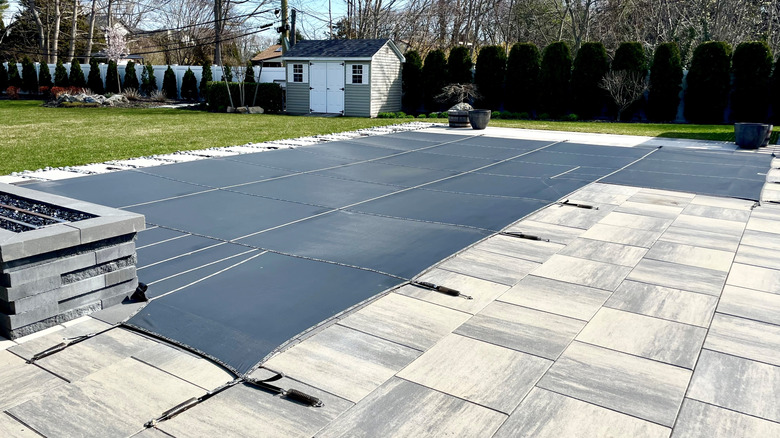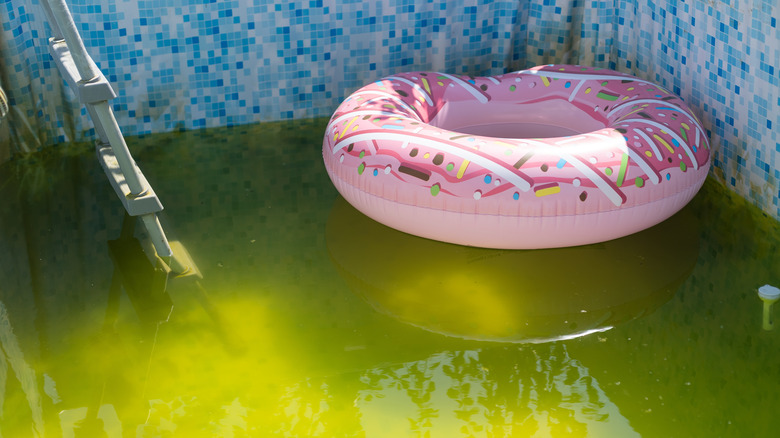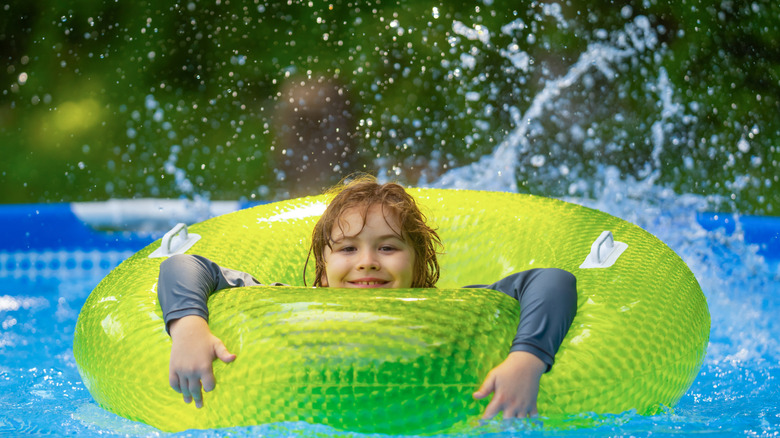The Common Outdoor Pool Winterization Mistake You Really Don't Want To Make
We may receive a commission on purchases made from links.
Life is hectic, and important tasks often get thrown to the side to make space and time for even more necessary ones. Unfortunately, something that seems minor in the moment may end up being quite problematic in the end. Such is the case with winterizing your pool. It's a rather long, and tiring process you probably have to do every year. While pools are one of several outdoor upgrades that add serious value to your home, they end up taking a lot of time and care to keep them working properly.
However, it's important to make sure it's done on time, and correctly, or you risk damaging your pool. Jimmie Meece, President of America's Swimming Pool Company, spoke exclusively to Outdoor Guide, covering the common problems that occur with winterizing your pool, and how to do it properly. According to Meece, the issue lies in the choice of tarp. "The most common pool winterization mistake homeowners make is using a standard tarp to cover their pool in the winter. Tarps aren't strong enough to hold the weight of heavy precipitation, and they can be a safety hazard. Choose a high-quality and seasonally appropriate pool tarp to cover your pool."
There are only five main types of covers; solid, automatic, solar, mesh, and water bag. However, even with only five choices, it can be difficult to determine which ones are better to use in certain situations, and which are worth the cost.
The most common winterization mistake
If you live in a place that gets lots of snow, you may want a mesh pool cover. They are safe and durable, and have small holes to allow rain and melted snow to go through. However, the mesh also means fine contaminants slip into the water, so you might have to deal with a dirtier pool and more algae at the beginning of the season. Solid covers stop that, but can't always handle the heavy weight of snow and rain, which means you may need to buy a cover pump. Either way, you'll want one geared towards safety to ensure no person or animal can fall in and injure themselves.
As Meece explains, "A good cover will keep your pool protected from debris and be sturdy enough that any heavy precipitation won't cause a collapse. A safety cover is made of more durable, longer-lasting materials, and provides the best solution to help protect your pool while adding an additional layer of security to your backyard space. The cover should be installed securely — this may require the use of power tools. Monthly winter service maintenance is recommended to get the most life out of your pool cover and ensure a cleaner, clearer pool opening in the spring."
Though choosing the wrong cover is one of the biggest mistakes owners make, it's not the only one. Some people may also choose to winterize early, knowing they won't use their pool before winter hits. However, according to Meece, what might seem like a harmless step to get ahead of common winter chores may actually be more problematic than you could imagine. "Closing your pool too soon could result in a late-season algae bloom and green water when you open your pool in the spring."
Do you have to winterize your pool?
Of course, not winterizing is also a problem. "Closing a pool takes more than pulling out the ladder and unfurling the winter cover — it's a process that requires draining plumbing, re-balancing chemicals, and more. An improper closing leaves your pool susceptible to plumbing, liner, and pump damage," said Meece.
The best practice is to shut down your pool when the temperature is constantly below 65 degrees Fahrenheit. Any time after that, but before temperatures hit freezing is fine. Sometime during this range of weather, you will want to collect all of your tools, and begin winterizing your inground pool. Even if you go with a trendy and more budget-friendly alternative to a pool in your backyard, you may have to winterize it at some point.
In a few cases, pools can be more effort than they're worth, leading to an overrated outdoor upgrade that ends up a total money-waster. After all, if you live somewhere where the weather keeps cold most of the year, your pool stays winterized more often than it is up and ready for swimming. Additionally, if you have an above-ground pool, they are a little more delicate. This means that they require extra maintenance to winterize and may not be worth it for some individuals. So if you don't want to take the time to make sure it is ready every year, it may be worth getting rid of your pool and using that space in your yard for something more fun instead, like a fire pit and comfortable outdoor seating.


